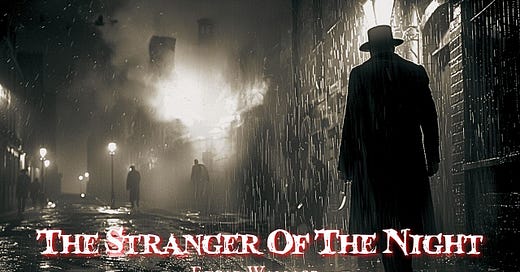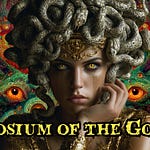Edgar Wallace's "The Stranger of the Night," is a well-crafted supernatural thriller first published on 15 October 1910. Follow the tale of George Thomas, a troubled man armed with a hidden knife, as he encounters a mysterious stranger who seems to understand his deepest fears and desires. This stranger, a seemingly benevolent spirit, guides George through a night of profound psychological and moral turmoil, leading to an unexpected and thought-provoking conclusion. Let Tony Walker's evocative storytelling immerse you in Wallace's world, where the boundaries between reality and the supernatural blur in this riveting tale.
Richard Horatio Edgar Wallace (1 April 1875 – 10 February 1932) was a prolific British author, playwright, and journalist, renowned for his contributions to the thriller genre. Born in Greenwich, London, Wallace's life began under challenging circumstances. He was the illegitimate son of actors Richard Horatio Marriott Edgar and Mary Jane "Polly" Richards, and was fostered by the Freeman family shortly after his birth.
Wallace's early life was marked by poverty and hardship. He left school at the age of 12 and took on various odd jobs before joining the army at 21. His career as a writer began during his military service in South Africa, where he was inspired by the works of Rudyard Kipling. Wallace published his first book of ballads, "The Mission that Failed!" in 1898. In 1899, he left the army and turned to full-time writing, becoming a war correspondent for Reuters and the Daily Mail during the Boer War.
Wallace's writing career flourished and h e established his own publishing company, Tallis Press, and published "The Four Just Men" in 1905. Although the venture was financially mismanaged, Wallace continued to write prolifically. His experiences in the Congo Free State, where he reported on Belgian atrocities, inspired his serialized stories which were later collected in the bestselling "Sanders of the River" (1911).
From 1908 to 1932, Wallace's output was extraordinary. He wrote over 170 novels, 18 stage plays, and 957 short stories. His works were translated into 28 languages and adapted into more than 160 films. Wallace became known as the "King of Thrillers," with his rapid writing style and ability to produce multiple works simultaneously. He was the first British crime novelist to use policemen as protagonists, setting a new trend in the genre.
One of Edgar Wallace's publishers once remarked that a quarter of all books read in early twentieth-century England were written by him. Wallace's prolific output encompassed journalism, screenplays, poetry, historical novels, non-fiction, eighteen stage plays, 957 short stories, and over 170 novels, with an astounding twelve novels published in 1929 alone. His works have inspired more than 160 films, yet today he is chiefly remembered for his contribution to the screenplay for "King Kong." Wallace's vast and varied body of work showcases his remarkable versatility and enduring influence in the literary and entertainment worlds.r
Wallace's personal life included a second marriage to his secretary, Ethel Violet King, in 1921, with whom he had a daughter, Margaret Penelope June. Despite his success, Wallace's extravagant lifestyle and gambling led to continual financial difficulties.
In 1931, Wallace moved to Hollywood to work as a scriptwriter for RKO. He was involved in the early development of "King Kong" but succumbed to undiagnosed diabetes on 10 February 1932, before the film was completed. Wallace's death marked the end of a remarkable career, but his influence on the thriller genre endures. He was buried in Little Marlow Cemetery, Buckinghamshire.
"The Stranger of the Night," a short fiction piece by Edgar Wallace, was first published on 15 October 1910.
I got this story from The Giant Book of Ghost Stories edited by Richard Dalby.
This well-crafted supernatural thriller tells the story of George Thomas, a criminal whose encounter with a mysterious stranger dramatically alters his fate. The stranger, who seamlessly enters George's home and life, acts like a benevolent spirit or eudaimon, guiding him through a night of psychological turmoil and eerie events.
"The Man of the Night" shares thematic parallels with the Apocryphal Book of Tobit. In Tobit, the archangel Raphael guides Tobias on a journey, providing protection and wisdom, much like the mysterious stranger who guides George Thomas. Both stories explore divine intervention and the idea of supernatural guidance leading to personal transformation. The stranger in Wallace's story, similar to Raphael, acts as a moral compass, steering George away from his destructive path.
A central theme in "The Man of the Night" is the tension between free will and the possibility of redemption. George Thomas, initially intent on committing murder, is influenced by the stranger to reconsider his actions. This interaction highlights the potential for human change and the role of free will in moral decisions. George's ultimate choice to abandon his violent plan and seek a new life suggests that redemption is always within reach, contingent upon one's willingness to change.
George Thomas's narrative is marked by his tendency to blame his wife for his misdeeds, projecting his moral failures onto her. This mirrors the biblical story of Adam blaming Eve for his transgression. George's inability to accept responsibility for his actions reflects a common human frailty: the reluctance to confront one's own flaws. Instead of acknowledging his agency in his criminal behavior, George convinces himself that his wife's betrayal drove him to crime. This deflection of blame underscores a critical examination of personal accountability and the human propensity to externalize guilt.
.














Share this post